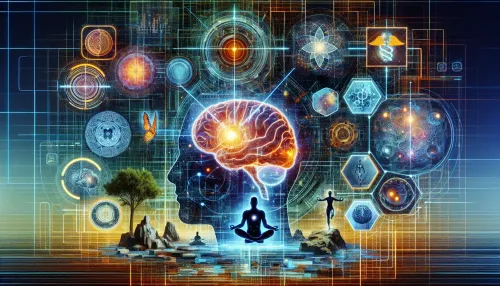Holistic Healing: Navigating Truths and Misconceptions in Alternative Therapies

In the realm of alternative therapies, acupuncture has garnered attention for its potential in managing pain. Originating from traditional Chinese medicine (TCM), this practice involves inserting thin needles into specific points on the body to restore the body's flow of energy, known as qi. The effectiveness of acupuncture in pain management has sparked both interest and skepticism within the medical and wellness communities.
Understanding Acupuncture for Pain Management
Numerous studies have delved into the efficacy of acupuncture for various types of pain, including chronic back pain, migraines, and osteoarthritis. Research suggests that acupuncture may stimulate the release of endorphins, the body's natural pain-killing chemicals, while also influencing neurotransmitters and anti-inflammatory markers. Additionally, proponents argue that acupuncture points align with nerve bundles and major muscle groups, thereby affecting bodily functions.
However, while several clinical trials have shown promising results in alleviating pain through acupuncture, some findings remain inconclusive due to methodological limitations or placebo effects. It is essential to acknowledge that individual responses to acupuncture can vary significantly, emphasizing the importance of personalized care and a holistic approach when considering this modality for pain management.
Homeopathy has been a subject of debate within the realm of holistic healing, as it operates on the principle of "like cures like" and uses highly diluted substances to trigger the body's natural healing processes. Proponents highlight its individualized approach and minimal side effects, while skeptics question its scientific plausibility and reliance on ultra-dilutions.
Exploring Homeopathy: Facts vs. Myths
While some clinical studies support the potential efficacy of homeopathic remedies in certain conditions, including allergies and respiratory ailments, the overall body of evidence remains controversial. The underlying mechanisms purported by homeopathy often defy conventional scientific understanding, leading to skepticism from mainstream medical professionals.
In navigating truths and misconceptions about homeopathy, it is crucial to critically assess scientific research while acknowledging individual anecdotes and experiences. Considering its personalized nature and relatively low-risk profile, individuals may choose to explore homeopathy as a complementary approach under the guidance of qualified practitioners.
Originating from ancient India, Ayurveda encompasses a comprehensive system focused on achieving balance and harmony within the body. With its emphasis on dietary modifications, herbal remedies, massage therapies, and meditation practices tailored to an individual's constitution or "dosha," Ayurveda offers a holistic approach to wellness that extends beyond physical health.
While Ayurvedic principles advocate for preventive care and overall well-being, its clinical efficacy has garnered mixed opinions within modern healthcare systems. Some Ayurvedic herbs and formulations have demonstrated potential in managing conditions such as inflammation and digestive disorders. However, it is essential to navigate through legitimate sources to identify evidence-backed applications of Ayurveda for specific health concerns.
Related Article: Holistic Healing Innovations: Advancements in Natural Therapies
The Benefits and Challenges of Ayurveda
Furthermore, the globalization of Ayurveda has raised concerns about misappropriation and misinterpretation of its practices outside their cultural context. Respecting the traditions and knowledge rooted in Ayurveda while engaging with qualified practitioners becomes imperative for those seeking its benefits within a holistic healthcare framework.
In the pursuit of holistic wellness, natural supplements and herbal remedies have gained popularity as alternatives or complements to conventional medicine. However, navigating through a myriad of products and claims warrants discernment to separate evidence-based benefits from unfounded assertions within this domain.
The regulatory landscape for natural supplements and herbal remedies varies across regions, contributing to concerns about product quality, standardization, and safety. While certain botanicals have shown promise in supporting immune function or addressing specific deficiencies, misconceptions surrounding their universal efficacy or safety profiles remain prevalent.
Natural Supplements: Navigating Efficacy and Safety
Consumers aiming to integrate natural supplements or herbal remedies into their wellness regimen should prioritize consultation with healthcare professionals or qualified herbalists. Understanding potential interactions with existing medications or health conditions alongside the need for reputable sourcing enhances informed decision-making in embracing these adjunctive approaches sustainably.
Energy healing practices encompass a spectrum of modalities that center around manipulating or channeling intrinsic energy for therapeutic purposes. Both Reiki a Japanese technique based on energy channeling through touch and Qigong an ancient Chinese system emphasizing movement, breathwork, and meditation are rooted in the concept of optimizing energetic balance within the body.
While anecdotal accounts underscore profound experiences with energy healing practices, scientific validation often encounters challenges due to complexities in measuring subtle energy phenomena. Skeptics raise valid concerns regarding the lack of empirical evidence supporting purported mechanisms underpinning these practices.
Nonetheless, individuals exploring energy healing approaches find value in their integrative nature complementing conventional treatment plans or serving as avenues for relaxation and stress reduction. Cultivating an open-minded yet discerning perspective when engaging with energy healing modalities promotes an enriching exploration within one's holistic wellness journey.
Related Article: Pursuing Professional Paths in Integrative Medicine: Fusing Traditional and Alternative Healing
Energy Healing Practices: Reiki and Qigong Explained
Traditional Chinese medicine (TCM) encapsulates a diverse array of modalities comprising acupuncture, herbal medicine, cupping therapy, and tai chi each rooted in centuries-old philosophies addressing health holistically. TCM's approach emphasizes restoring harmony among bodily systems by considering energetic pathways (meridians) alongside physical manifestations of imbalances.
As TCM gains global recognition, it becomes paramount to discern accurate perspectives by referencing reputable sources and practitioners deeply grounded in TCM principles. The efficacy of TCM modalities often intertwines with cultural contexts and individualized diagnoses drawn from TCM assessments.
Navigating through claims about TCM's breadth requires consideration of both historical wisdom passed down through generations and contemporary research corroborating its applications. Acknowledging TCM's nuanced nature can foster an appreciation for its potential contributions to comprehensive healthcare frameworks while dispelling misinterpretations or oversimplifications.
Fact-Checking Traditional Chinese Medicine (TCM)
Integrative medicine represents an evolving paradigm that harmonizes conventional biomedical approaches with complementary therapies rooted in evidence-based practices. This collaborative model encourages a comprehensive view of patient care by integrating lifestyle modifications, mind-body interventions, nutritional guidance, and select alternative modalities alongside conventional treatments.
A fundamental aspect of integrative medicine lies in personalized care tailoring interventions based on an individual's unique physiological makeup, health goals, and preferences alongside critical consideration of safety and efficacy profiles across interventions applied.
By elevating awareness surrounding integrative practices, individuals gain insights into navigating diverse options encompassed within holistic healthcare frameworks while upholding informed decision-making aligned with their health needs and aspirations.
Frequently Asked Questions
Acupuncture is a practice from traditional Chinese medicine that involves inserting thin needles into specific points on the body to restore energy flow, known as qi. It may help manage pain by stimulating the release of endorphins and influencing neurotransmitters, although individual responses can vary significantly.
Homeopathy operates on the principle of "like cures like," using highly diluted substances to trigger the body's natural healing processes. Unlike conventional medicine, which often relies on empirical evidence and standardized treatments, homeopathy emphasizes individualized care and minimal side effects, though its scientific plausibility remains debated.
Ayurveda is an ancient Indian system focused on achieving balance within the body through dietary modifications, herbal remedies, and practices like meditation. It promotes preventive care and overall wellness, though its clinical efficacy can be mixed. Engaging with qualified practitioners is essential for navigating its applications effectively.
Check Out These Related Articles

Career Development in Mind-Body Wellness: Fostering Mental and Physical Harmony

Integrative Mediterranean Medicine: Melding Ancient Wisdom with Modern Health Science

The Revolutionary Potential of Psychedelic Therapy: Transformative Insights and Promising Results
